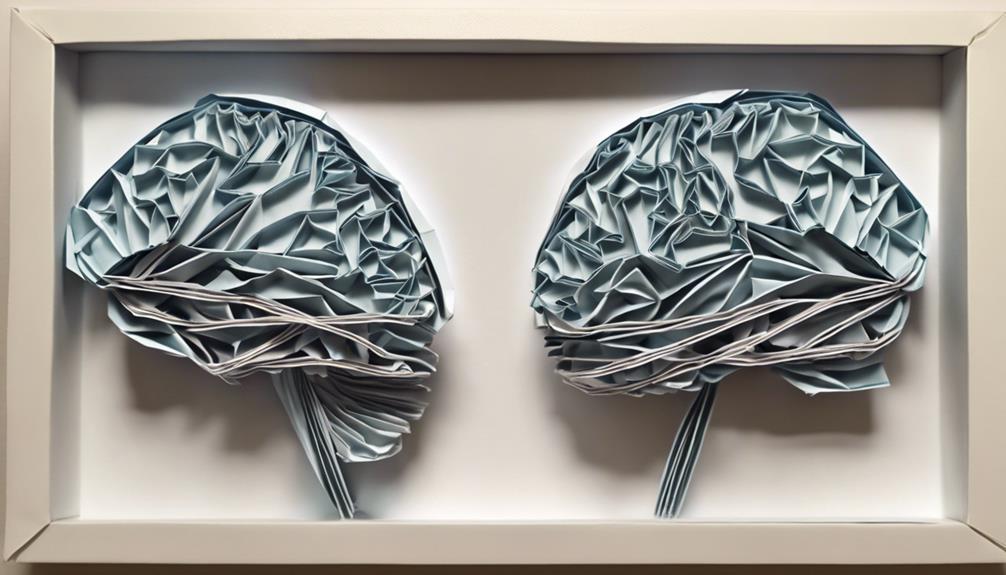Understanding addiction involves acknowledging it as a complex disease that changes brain functions, resulting in compulsive behaviors despite negative consequences. Genetic and environmental factors are significant contributors to substance use disorders. Childhood trauma, such as abuse, can exacerbate addiction. Cravings and loss of control arise from intricate adjustments in the brain’s reward system. The release of dopamine reinforces addictive behaviors, affecting decision-making and impulse control. Overcoming addiction entails recognizing triggers, adopting healthy habits, building support systems, and utilizing coping mechanisms. Different therapies address psychological issues, while individualized treatment plans improve recovery outcomes. Educating oneself on the brain’s role in addiction and the impact of stigma and environmental factors can help in overcoming dependency.
Key Takeaways
- Addiction is a disease altering brain function and behavior.
- Genetic and environmental factors influence substance use disorders.
- Overcoming addiction involves addressing triggers and developing coping strategies.
- Dual diagnosis treatment addresses substance use and mental health conditions.
- Supportive environments, therapy, and tailored treatment plans aid in recovery.
Definition of Addiction
Understanding addiction involves recognizing it as a critical disease that alters the brain's structure and function, leading to compulsive substance use despite negative consequences. Addiction is classified as a mental illness, commonly co-occurring with other mental health disorders, affecting a substantial portion of adults in the U.S.
Genetic factors, alongside environmental influences, play vital roles in the development of substance use disorders. Childhood experiences such as abuse and neglect can greatly contribute to the onset of addiction. This condition involves intricate changes in brain function, particularly impacting the brain's reward system, resulting in cravings and a diminished ability to control substance consumption.
Dual Diagnosis Treatment

Recognizing the interconnected nature of substance use disorders and mental health conditions, dual diagnosis treatment addresses both issues simultaneously to provide all-encompassing care for individuals facing these challenges. Nearly half of those with a substance use disorder also experience a co-occurring mental health disorder, highlighting the importance of integrated treatment approaches.
In dual diagnosis programs, the goal is to create holistic treatment plans that cater to both mental health conditions and substance use disorders. This inclusive method involves a multidisciplinary approach incorporating therapy, medication, and support systems to address the complex needs of individuals with co-occurring disorders.
Studies show that early identification and treatment of dual diagnosis greatly enhance long-term recovery outcomes, emphasizing the effectiveness of a combined therapeutic strategy. By integrating mental health care with substance use disorder treatment, dual diagnosis programs offer a more tailored and effective approach to help individuals overcome the challenges associated with co-occurring disorders.
Impact of Stigma on Recovery

How does stigma affect the recovery process for individuals struggling with addiction?
Stigma surrounding addiction can have a significant impact on those seeking recovery. Negative stereotypes and discrimination can create barriers to seeking help and support, leading to feelings of shame, guilt, and isolation. Overcoming addiction is already a challenging journey, and the added weight of societal stigma can make it even more difficult for individuals to progress in their recovery.
Education and awareness play essential roles in combating stigma and fostering understanding of addiction as a treatable condition. Supportive environments that offer non-judgmental attitudes are pivotal in helping individuals overcome the stigma associated with addiction recovery.
Coping With Cravings

When dealing with cravings during addiction recovery, it's essential to identify triggers that prompt intense desires for substances.
Developing healthy habits, such as exercise or mindfulness practices, can assist in redirecting your focus away from cravings.
Seeking support systems, like therapists, support groups, or loved ones, can provide guidance and encouragement in managing and overcoming cravings effectively.
Identifying Triggers
To effectively cope with cravings, it's important to pinpoint the specific triggers that lead to addictive behaviors. Identifying triggers such as stress, anxiety, trauma, or environmental cues is essential in managing cravings and preventing relapse. By recognizing these triggers, you can develop coping strategies that help you navigate challenging situations without resorting to addictive behavior.
Understanding and managing triggers are vital steps in overcoming addiction. By identifying the specific situations or emotions that trigger cravings, you can work towards developing effective coping mechanisms. This process not only helps in the short term but also supports long-term recovery by preventing setbacks and promoting healthier habits.
Learning to navigate triggering situations is key to maintaining sobriety and achieving lasting success in overcoming addiction. By addressing and managing your triggers, you empower yourself to make healthier choices and build a solid foundation for a fulfilling, addiction-free life.
Developing Healthy Habits
Developing healthy habits is essential in effectively coping with cravings during addiction recovery. Cravings can be triggered by various factors such as stress, emotional states, and environmental cues.
In order to combat these cravings, it's important to incorporate coping mechanisms into your daily routine. Engaging in physical activities can help alleviate both physical and emotional tension, while practicing relaxation techniques like deep breathing or meditation can aid in stress management.
Creating a support network of friends, family, or professionals can provide encouragement and guidance during challenging times. Setting realistic goals for yourself, such as engaging in hobbies or pursuing treatment options, can give you a sense of purpose and achievement.
Seeking Support Systems
By seeking support systems, individuals can effectively cope with cravings during addiction recovery. Support systems such as therapy, counseling, and support groups play an essential role in helping individuals navigate the challenges of overcoming addiction.
These resources provide a safe space for individuals to express their struggles, receive guidance on healthy coping strategies, and find encouragement from others facing similar battles.
Therapy sessions equip individuals with coping skills that empower them to manage cravings and prevent relapse. Counseling offers personalized support tailored to each individual's needs, aiding in developing resilience against triggers that may lead to cravings.
Support groups, where individuals engage with peers who understand their journey, create a sense of community that fosters understanding and solidarity. By actively participating in these support systems, individuals strengthen their resolve, build healthier habits, and increase their chances of successful addiction recovery.
Brain and Addiction

When exploring the topic of 'Brain and Addiction', it's essential to understand how neural pathways in addiction play a significant role.
The release of dopamine triggered by substance use impacts the pleasure center of the brain, reinforcing addictive behaviors.
These alterations in brain chemistry can lead to intense cravings and a loss of control over drug consumption.
Neural Pathways in Addiction
Addiction profoundly alters neural pathways in the brain, particularly impacting the reward system and decision-making processes. Dopamine release, a neurotransmitter associated with pleasure and reward, plays a vital role in reinforcing addictive behaviors. The prefrontal cortex, responsible for decision-making, and the limbic system, involved in processing emotions and memories, are greatly affected by addictive substances. Neuroplasticity, the brain's ability to reorganize itself by forming new neural connections, enables the brain to adapt to the presence of addictive substances, leading to tolerance and dependence.
| Neural Mechanism | Role in Addiction |
|---|---|
| Dopamine release | Reinforces addictive behaviors and triggers cravings |
| Prefrontal Cortex | Impacts decision-making processes and impulse control |
| Limbic System | Influences emotional responses and memory associations |
| Neuroplasticity | Allows the brain to adapt and develop tolerance |
| Reward System | Altered by addictive substances, driving addiction |
Dopamine and Cravings
The role of dopamine in addiction is pivotal, driving cravings and reinforcing addictive behaviors in the brain's reward system. Dopamine, a neurotransmitter linked to pleasurable activities like substance use, plays an important role in the development and maintenance of addiction.
When substances are consumed, dopamine is released in the brain, creating feelings of pleasure and reward. This dopamine release, over time, becomes associated with substance use, leading to intense cravings for the pleasurable effects. Repeated substance use alters dopamine levels and receptor activity, further intensifying cravings and solidifying addictive patterns.
Understanding the connection between dopamine and cravings is essential for developing effective treatments to address addiction. Targeted therapies that focus on regulating dopamine levels can help individuals manage cravings and work towards recovery.
Co-Occurring Disorders

Understanding co-occurring disorders involves recognizing the simultaneous presence of substance use disorder and mental health conditions within an individual. Common mental health conditions seen in conjunction with substance use disorder include depression, anxiety, PTSD, bipolar disorder, and schizophrenia.
Nearly 8.5 million adults in the U.S. are affected by these dual diagnoses, facing challenges in receiving appropriate care due to the intricate nature of their conditions. Integrated treatment approaches that address both substance use and mental health disorders concurrently are crucial for effective recovery in individuals with co-occurring disorders.
Without such holistic interventions, individuals face higher rates of relapse and struggle to achieve sustained wellness. The term 'dual diagnosis' is often used to describe these intertwined conditions, highlighting the necessity of tailored and essential treatment strategies.
Treating Substance Use Disorders

Detox and inpatient care play an essential role in addressing physical drug or alcohol dependence. These treatments focus on managing the withdrawal symptoms and ensuring a safe shift to sobriety.
Residential treatment programs offer a structured environment free from drugs or alcohol, typically lasting between 14 to 30 days. Outpatient treatment options provide less intensive care for individuals in stable recovery, allowing them to continue their daily lives while receiving support.
Behavioral therapies are key components of addiction treatment, addressing both the physical and psychological aspects of substance use disorders. Evidence-based treatments target the underlying causes of addiction, such as trauma or co-occurring mental health conditions.
Programs like AA, NA, and SMART Recovery offer peer support and guidance during the recovery journey. Specialized treatments for co-occurring disorders focus on integrating evidence-based therapies to effectively manage both substance use and mental health conditions.
Environmental Factors in Recovery

When it comes to addiction recovery, your surroundings play a pivotal role in your journey. Supportive living environments, the influence of peers, and the impact of therapy all factor into your recovery process.
Supportive Living Environments
Supportive living environments are instrumental in fostering successful addiction recovery by providing essential structure, accountability, and community support for individuals seeking sobriety. These environments offer a stable and drug-free setting where individuals can focus on their recovery journey.
Here are five key points to contemplate:
- Structured Routine: Supportive living environments establish daily routines that help individuals develop healthy habits and maintain consistency in their recovery efforts.
- Personal Accountability: Residents are encouraged to take responsibility for their actions and progress, fostering a sense of ownership in their sobriety journey.
- Community Support: Being surrounded by individuals who understand the challenges of addiction creates a supportive network that promotes encouragement and understanding.
- Safe Space: The drug-free setting of these environments provides a safe space for individuals to heal and grow without the triggers present in their previous environments.
- Long-Term Success: Living in a supportive environment increases the likelihood of long-term recovery by offering ongoing support and guidance during the challenging phases of addiction recovery.
Impact of Peers
Peers' influence on addiction recovery outcomes is significant, with social networks and environmental factors playing a pivotal role in shaping individuals' journey towards sobriety. Positive peer support and connections within social networks can be instrumental in maintaining sobriety and preventing relapse. Being surrounded by individuals who encourage healthy behaviors and offer support can bolster one's commitment to recovery.
Conversely, negative peer influences can trigger cravings and hinder progress in addiction recovery efforts. It's essential to be mindful of the company you keep and actively seek out positive influences that align with your goal of sobriety. Building a strong support system of peers who understand and respect your journey can provide a sense of belonging and encouragement during challenging times.
Role of Therapy
To address the environmental factors contributing to addiction and dependency, therapy plays a pivotal role in helping individuals identify and modify negative influences triggering addictive behaviors. Therapists assist in recognizing and altering these detrimental environmental triggers, such as stress, trauma, and social pressure, which can lead to addictive tendencies.
Through therapeutic interventions, a supportive environment is cultivated to aid in the recovery process and maintain long-term sobriety. Therapists collaborate with individuals to develop coping strategies and skills that empower them to navigate challenging environments without falling back into addictive behaviors.
- Therapy helps individuals identify and modify negative environmental influences.
- Therapeutic interventions focus on creating a supportive environment conducive to recovery.
- Coping strategies and skills are developed to navigate challenging environments.
- Stress, trauma, and social pressure are effectively managed through therapy.
- Therapists work with individuals to prevent relapse and promote long-term sobriety.
Overcoming Challenges

Addressing the challenges of overcoming addiction requires a holistic approach that encompasses physical, psychological, and social aspects of recovery.
When dealing with substance use, recognizing and addressing physical dependence is essential. Developing coping strategies to manage cravings and triggers plays a significant role in overcoming challenges.
Moreover, focusing on emotional well-being is vital for a successful recovery journey. Preventing relapse involves not only addressing the addiction itself but also the underlying psychological factors that contribute to it.
It's important to have a solid support system in place to navigate the difficulties that may arise during the recovery process. Stigma surrounding addiction can pose additional obstacles, making it necessary to create a safe and non-judgmental environment for those seeking treatment.
Tailored treatment plans that consider individual needs and circumstances are key in overcoming addiction challenges. By integrating these strategies, individuals can enhance their chances of achieving long-term recovery and leading fulfilling lives free from substance dependence.
Role of Therapies

Therapies play an essential role in the recovery journey from addiction by addressing underlying psychological issues and developing coping strategies.
Among the various addiction therapies available, Behavioral Therapy (CBT) stands out for challenging negative thought patterns and behaviors linked to addiction.
Family therapy involves loved ones in the recovery process, fostering improved communication and support systems.
Support groups like Alcoholics Anonymous (AA) and Narcotics Anonymous (NA) offer a sense of community and accountability important in overcoming addiction.
Individual psychotherapy sessions explore the root psychological issues contributing to addiction and aid in developing effective coping strategies.
Moreover, tailored treatment plans are indispensable, as they incorporate a combination of therapies to address the unique needs and challenges of each individual in recovery.
Frequently Asked Questions
What Is the Understanding of Addiction?
You understand addiction as a complex issue involving brain changes leading to compulsive substance use despite harm. Recognize it as a mental illness, not a sign of weakness, influenced by genetics, mental health, and trauma.
What Do You Understand by Substance Abuse and Dependence?
You understand substance abuse as misuse of drugs or alcohol despite negative consequences, and dependence as physical reliance leading to tolerance and withdrawal. Distinguishing between them is important for accurate diagnosis and effective treatment.
What Are the Five Recovery Skills?
To overcome addiction, focus on five key recovery skills: coping strategies, problem-solving techniques, emotional regulation tools, building a support network, setting boundaries, and improving self-care practices. Strengthening these skills enhances resilience and prevents relapse.
What Is the Best Explanation of Addiction?
You know addiction as a chronic brain disease marked by compulsive substance use despite harmful outcomes. It alters your brain's reward system, causing cravings and loss of control. Seeking assistance is crucial for recovery.
Conclusion
To sum up, overcoming addiction is a challenging journey that requires determination, support, and a willingness to confront the underlying issues. With the right treatment and strategies in place, individuals can break free from the cycle of dependency and reclaim their lives.
Remember, Rome wasn't built in a day, and recovery is a process that takes time and effort. Stay focused, stay strong, and remember that you're capable of overcoming any obstacle in your path.









